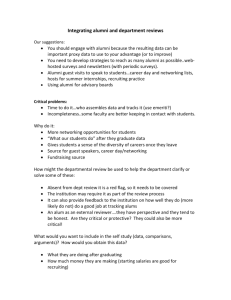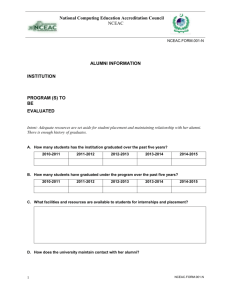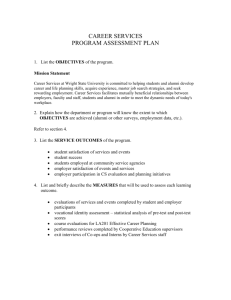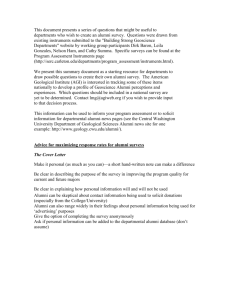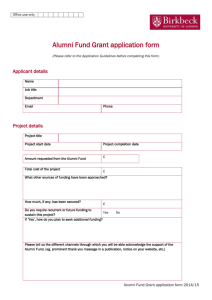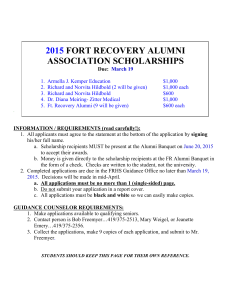Political Science Assessment Plan
advertisement
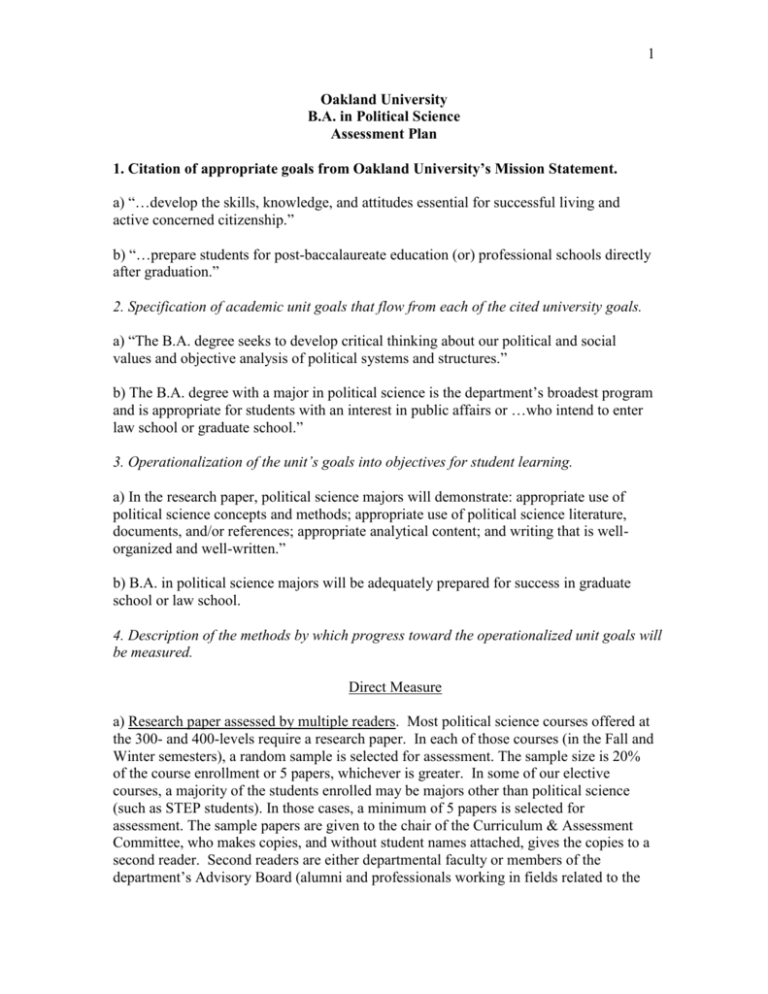
1 Oakland University B.A. in Political Science Assessment Plan 1. Citation of appropriate goals from Oakland University’s Mission Statement. a) “…develop the skills, knowledge, and attitudes essential for successful living and active concerned citizenship.” b) “…prepare students for post-baccalaureate education (or) professional schools directly after graduation.” 2. Specification of academic unit goals that flow from each of the cited university goals. a) “The B.A. degree seeks to develop critical thinking about our political and social values and objective analysis of political systems and structures.” b) The B.A. degree with a major in political science is the department’s broadest program and is appropriate for students with an interest in public affairs or …who intend to enter law school or graduate school.” 3. Operationalization of the unit’s goals into objectives for student learning. a) In the research paper, political science majors will demonstrate: appropriate use of political science concepts and methods; appropriate use of political science literature, documents, and/or references; appropriate analytical content; and writing that is wellorganized and well-written.” b) B.A. in political science majors will be adequately prepared for success in graduate school or law school. 4. Description of the methods by which progress toward the operationalized unit goals will be measured. Direct Measure a) Research paper assessed by multiple readers. Most political science courses offered at the 300- and 400-levels require a research paper. In each of those courses (in the Fall and Winter semesters), a random sample is selected for assessment. The sample size is 20% of the course enrollment or 5 papers, whichever is greater. In some of our elective courses, a majority of the students enrolled may be majors other than political science (such as STEP students). In those cases, a minimum of 5 papers is selected for assessment. The sample papers are given to the chair of the Curriculum & Assessment Committee, who makes copies, and without student names attached, gives the copies to a second reader. Second readers are either departmental faculty or members of the department’s Advisory Board (alumni and professionals working in fields related to the 2 discipline). Both sets of assessment readers use a 5-point scale rubric. Should a difference of more than two points occur with the first two readers, a third reader reviews the paper; the middle score is used as the final score. Because most of our courses assign a research paper, every political science major is placed in the assessment population multiple times. Random selection assures that the samples drawn are representative of our majors. (See attached rubric) Indirect Measures b.1) Alumni surveys. Surveys of departmental alumni will be administered every three years. The survey asks a number of questions related to student learning objectives, such as how their undergraduate degree related to their career or graduate school preparation (see attached copy of alumni survey). Surveys will be sent to all undergraduate alumni, typically about 30% respond to our surveys. b.2) Focus Groups. Focus groups of our undergraduate majors will be conducted every three years. In the past, we have set aside a T/Th noon lunch hour period to conduct these focus groups, or (as indicated in the attachment) embedded in a political science course, such as the one conducted in PS 353 in February 2001. Focus group questions touch on student learning objectives, such as career and graduate school preparation, as well as curricular and student services issues. 5. List the individual(s) who have primary responsibility for administering assessment activities. a) Virtually all faculty members teach at least one class in which they participate in the research paper assessment. Those who do not require a research paper in a given term serve as second readers. Departmental Advisory Board members volunteer to serve as second readers also. The Chair of the department’s Curriculum and Assessment Committee administers the assessment of research papers. b.1) The alumni survey is conducted by volunteer faculty members, usually those who teach the Research Methods courses. These volunteers also submit a written report to the Curriculum and Assessment Committee, who discusses and analyzes the results and makes a report to the full department faculty each year. b.2) The focus groups have been conducted by volunteer departmental faculty, who also write the report, and submit it to the Curriculum & Assessment Committee. An oral report is usually given to the C & A Committee as well. In turn, the Committee reports to the full department once each year (or as often as a focus group report is available) for discussion. 3 6. Describe the procedures used in your academic unit for translating assessment results into program changes. Departmental faculty members meet on a monthly basis throughout the academic year. At least one meeting per semester is devoted in part of in whole to assessment. Additional meetings dedicated specifically to assessment are called if needed. Departmental faculty members occasionally discuss assessment-related topics via email on an on-going basis. Once results from the research papers, alumni survey and focus groups are analyzed and reported, all full-time faculty participate in a discussion of the results and their impact on the program’s objectives. Due to the nature of some of our information gathering – surveys and focus groups conducted every three years – actual programmatic changes usually aren’t contemplated until consistent results across different methods and measures (and over multiple years) indicate a definite trend that suggests program or curricular revisions. Departmental faculty members are committed to continuous, on-going self-assessment. Results from all of our assessment data collection activities are regularly evaluated to determine if any program changes are indicated. 4 Assessment Plan Goal Cited In OU Mission “…undergraduates develop the skills, knowledge and attitudes essential for active, concerned citizenship.” “…prepare students for post-baccalaureate education (or ) professional schools directly after graduation.” Relevant Goal Of Unit Student Learning Objectives Methods of Assessment Individual(s) Responsible for Assessment Activities “The B.A. degree seeks to develop critical thinking about our political and social values and objective analysis of political systems and structures.” In paper, students will be Multiple readers of able to demonstrate: (1) Research paper using appropriate use of PS Locally-developed concepts & methods; (2) Rubric and scoring appropriate use of PS method literature, documents, and/or references; (3) appropriate analytical content; (4) writing that is well-organized and well-written. Multiple raters (course Instructor and a 2nd faculty or outside reader from dept.’s Advisory Board) The B.A. degree with a major in political science is the department’s broadest program and is appropriate for students with an interest in public affairs or … who intend to enter law school or graduate school.” B.A. majors will be adequately prepared for success in graduate or law school 1) Faculty volunteers administer alumni survey; 2) faculty volunteers conduct focus group, write report, and submit report to Curriculum & Assessment Committee 1) Alumni survey (every three years); 2) Focus Group (every three years) – not conducted in same years Procedures for Using Assessment Results to Improve Program Dept. faculty will review results annually and discuss ways to improve curriculum, course content, and clarify objectives Curriculum & Assessment Committee analyzes results and reports to full department for discussion of ways to improve curriculum, course content, and to clarify student learning objectives

